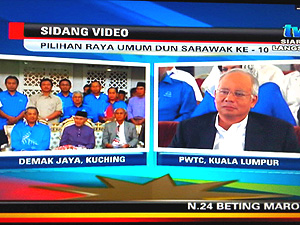ANALYSIS What is apparent from the just-concluded Sarawak election is that money talks and voters are still easily swayed by short-term gains and quick fixes, opined political analysts.
Barisan Nasional has kept its two-thirds majority in the Sarawak state assembly, bagging 55 out of 71 constituencies, with DAP coming in second with 12, PKR with three seats and one secured by an Independent candidate.
 The winds of change which were
expected
to blow through Sarawak, however forceful, were thwarted as fear and financial dependance on the government still play a role.
The winds of change which were
expected
to blow through Sarawak, however forceful, were thwarted as fear and financial dependance on the government still play a role.
Sarawak - the country’s largest and most resource-rich state but which remains severely impoverished - is considered the ruling coalition’s ‘fixed deposit’ but is nevertheless showing a strong resistance as the opposition had doubled its representation this time around.
Following are excepts of comments from analysts, several of whom had ventured to the ground during the 10-day campaign period:-
Mohd Faizal Syam Abdol Hazis, head of political studies, Universiti Malaysia Sarawak (Unimas)
In the rural areas the opposition is not just contesting against the state but also the federal machinery. If you talk to the ordinary people, there is obvious general discontent against BN but these sentiments are not really reflected in the results.
 For the Malay-Melanau community especially, politics of patronage still plays a major role. We expect this from civil servants and maybe the business community but the ordinary Malays are also cautious as they don’t want their children and future to be victimised.
For the Malay-Melanau community especially, politics of patronage still plays a major role. We expect this from civil servants and maybe the business community but the ordinary Malays are also cautious as they don’t want their children and future to be victimised.
The possibility of the opposition to win more than what they have is still there (in future), if there was a level playing field in terms of access to the media and contests between parties.
Despite being unhappy and marginalised, and despite promises of development not trickling down in rural areas as promised, they are not willing to take the risk and they are very much dependent on BN.
The access to alternative information is not there and I would say that there is still fear, real or perceived.
Another obvious instrument of control is government agencies, especially the Community Development Department (Kemas) which is very influential in rural areas. Their eyes would know who supports BN and who votes for the opposition.
The Malays are scared that a non-Malay might take over the state and their position would be threatened.
 Overall, what we describe as the ‘politics of Panadol’ is still prevalent here. People are relieved of their pain and suffering with RM20 or RM30 and a
tangki air
(water tank), and then they are willing to bear the pain for the next five years.
Overall, what we describe as the ‘politics of Panadol’ is still prevalent here. People are relieved of their pain and suffering with RM20 or RM30 and a
tangki air
(water tank), and then they are willing to bear the pain for the next five years.
PAS is making inroads as they had clearly managed to reduce BN’s majority... there was even a longhouse where PAS had captured the residents’ support.
James Chin, political analyst, School of Arts and Social Sciences at Monash University
The results are not a surprise given that rural seats are going to decide the outcome. Barisan is strongest in rural areas.
These are places where money politics plays a big role. Even in urban areas voters were being paid RM300 per vote.
 In rural Iban and Dayak areas it is not unexpected, given that they depend on BN for their livelihood.
In rural Iban and Dayak areas it is not unexpected, given that they depend on BN for their livelihood.
SUPP president George Chan’s loss was expected because of two reason. Firstly it is his strong anti-Foo Chow sentiments. The Chinese tycoons (from the clan who dominant Piasau) played their cards well to ensure he lost.
Chan took the fall also because he is seen as a close allay of (Chief Minister) Abdul Taib Mahmud.
Chan Eng Seng, veteran journalist and Miri-based researcher
The infighting in SUPP since the last state election had weakened the party, thus causing the losses for the party.
Even DAP could defeat George Chan in Piasau, although DAP does not have a strong base in Miri. The future of SUPP most possibly will be like what had hit Gerakan after the March 3, 2008 general election.
Although there are some SUPP candidates who were elected today, they cannot guarantee the future of the party. SUPP is totally gone.
The SUPP is too close to Taib, and this is something most Chinese voters can no longer compromise on.




